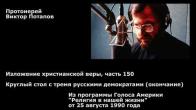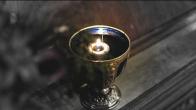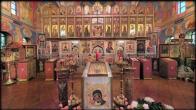ABOUT ORTHODOXY
You are here
The Parable of the Laborers Who Received the Same Wages
This parable, which some Church writers call the parable "of the husbandmen called to work at various times of the day", we find in the Gospel according to Matthew:
For the kingdom of heaven is like unto a man that is an householder, which went out early in the morning to hire labourers into his vineyard. And when he had agreed with the labourers for a penny a day, he sent them into his vineyard. And he went out about the third hour, and saw others standing idle in the market place, and said unto them, Go ye also into the vineyard, and whatsoever is right I will give you. And they went their way. Again he went out about the sixth and ninth hour, and did likewise. And about the eleventh hour he went out, and found others standing idle, and saith unto them, Why stand ye here all the day idle? They say unto him, Because no man hath hired us. He saith unto them, Go ye also into the vineyard; and whatsoever is right, that shall ye receive. So when even was come, the lord of the vineyard saith unto his steward, Call the labourers, and give them their hire, beginning from the last unto the first. And when they came that were hired about the eleventh hour, they received every man a penny. But when the first came, they supposed that they should have received more; and they likewise received every man a penny. And when they had received it, they murmured against the goodman of the house, saying, These last have wrought but one hour, and thou hast made them equal unto us, which have borne the burden and heat of the day. But he answered one of them, and said, Friend, I do thee no wrong: didst not thou agree with me for a penny? Take that thine is, and go thy way: I will give unto this last, even as unto thee. Is it not lawful for me to do what I will with mine own? Is thine eye evil, because I am good? So the last shall be first, and the first last: for many be called, but few chosen (Matthew 20:1-16).
At the dawn of the Church's history, the Word of God, in summoning [men] to the Kingdom of Heaven, sounded forth first of all in the midst of the Jewish people. By the mouths of the Old Testament prophets, right up to Saint John the Forerunner, and, at the end of the ages, by the mouth of the God-Man Himself, the ancient Israel was the first to be summoned unto the work in the vineyard of the Lord God.
After that, the Good Tidings were carried throughout the whole world through the labors of the holy Apostles and other preachers. The Gospel is all the time summoning individual men and whole nations to the work in Christ's field; it calls all to God's work who are standing idle in the market place, that is, the spiritually unemployed.
The "hours" - the third, sixth, ninth, eleventh - can signify either the various epochs in the Church's history, when one or another people is first summoned to participation in the building up of the Kingdom of God, or the various moments in a man's individual life (early youth, maturity, old age), when the heart first hears and accepts the summons of the Word of God.
The "evening" is the end of the work day, that is, symbolically it is the end of the Church's earthly history or the end of a man's individual life, his hour of death.
Just as the owner of the vineyard went out himself to seek laborers for himself, so Christ Himself also summons workers unto Himself: Ye have not chosen me, but I have chosen you (John 15:16), He says to His Apostles. Every good thought, every good impulse to labor for the Lord, for the salvation of one's soul, comes from the Lord: The Lord calls all unto salvation, calls all into His vineyard, into His Church to labor; but it depends on man to obey or not to obey this divine call, to take the grace filled impulse to heart or to oppose it. In this is man's freedom.
The "penny" ["denarius" in Greek] is the recompense of eternal beatitude in heaven. Those who came early in the morning and those who came late received the same remuneration. This very much grieved those who came early and they began to murmur against the owner. Here human, formal fairness wants to set itself up against divine compassion and love.
The husbandmen would not have begun to murmur against the owner if he had given to the "last" less than one denarius, that is, a sum insufficient for a day's sustenance. They had no business with those who had come "last"; in their souls there appeared envy, unfriendliness and condemnation of the owner's supposedly unfair compassion, which hurt their pride. How could he make those who were called "first" equal to those who came "last".
The elder brother in the parable of the prodigal son also spoke in a like manner: Lo, these many years do I serve thee, neither transgressed I at any time thy commandment: and yet thou never gavest me a kid, that I might make merry with my friends: but as soon as this thy son was come, which hath devoured thy living with harlots, thou hast killed for him the fatted calf (Luke 15:29-30).
This whole gamut of morally insignificant feelings, which gripped the "first" (and the elder son of the parable), already, in essence, undermined the quality of their labor in the Lord's field. After all, one can work even a whole day in a bad mood and still not do anything good; but in "one hour", one can do more and better if the work is performed with full diligence, love for the work and trust in the owner.
The husbandmen's appraisal proved to be formal, while the owner's was spiritual and moral. And according to this appraisal, the "last" became "first", and the "first" "last", and, perhaps, were even completely deprived of participation in the Kingdom of Heaven. For, Christ added, many be called, but few chosen (Matthew 20:1-16).
By this parable, the Lord teaches us that God's grace, as well as eternal life, is given to a man, not as a result of an arithmetical calculation of the quantity of his works or according to the time of his sojourn in the Church, but according to God's mercy. The Jews thought that a greater recompense was due them, as the first members of the Messiah's Kingdom, in comparison with the Christians of non-Jewish descent who had joined this Kingdom later. But God has an entirely different measure of righteousness. On His scales, sincerity, diligence, pure love and humility are more valuable than the external and formal side of human works. The good thief, who repented so late and sincerely on the cross and believed in the rejected and tormented Saviour with his whole heart, was deemed worthy of the Kingdom of Heaven equally with the other righteous, who had served God from early childhood.
Saint John Chrysostom adds an excellent supplement to this parable of the Lord: "If any be pious and God-loving, let him enjoy this fair and radiant solemnity. If any be a wise servant, let him enter rejoicing into the joy of his Lord. If any have labored in fasting, let him receive now his denarius. If any have wrought from the first hour, let him receive today his just due. If any have come after the third hour, let him feast with thankfulness. If any have arrived after the sixth hour, let him doubt nothing, for he will in no way suffer loss. If any have come later than even the ninth hour, let him draw nigh, doubting nothing, fearing nothing.
If any have only arrived at even the eleventh hour, let him not be afraid for his slowness: for the Master, Who is munificent, receiveth the last even as the first: He giveth rest to him that came at the eleventh hour, even as to him who wrought from the first hour; on the last He hath mercy, and the first He pleaseth; to this one He giveth, and on that one He bestoweth; and the works He receiveth, and the intention he welcometh, and the deed He honoreth, and the purpose He praiseth. Wherefore, then, enter ye all into the joy of your Lord: both first and second, receive your reward. Ye rich and ye poor, dance with one another. Ye abstemious and ye slothful, honor the day. Ye that have fasted and ye that have not fasted, be glad today. The table is ful l… let all enjoy the banquet of faith: Receive all ye the wealth of goodness!.."
©V. Potapov
PARISH LIFE
RECENT VIDEOS
Address of our Cathedral
Subscribe to our mailing list
While all the materials on this site are copyrighted, you may use them freely as long as you treat them
with respect and provide attribution on the Russian Orthodox Cathedral of St.John the Baptist of Washington DC.









